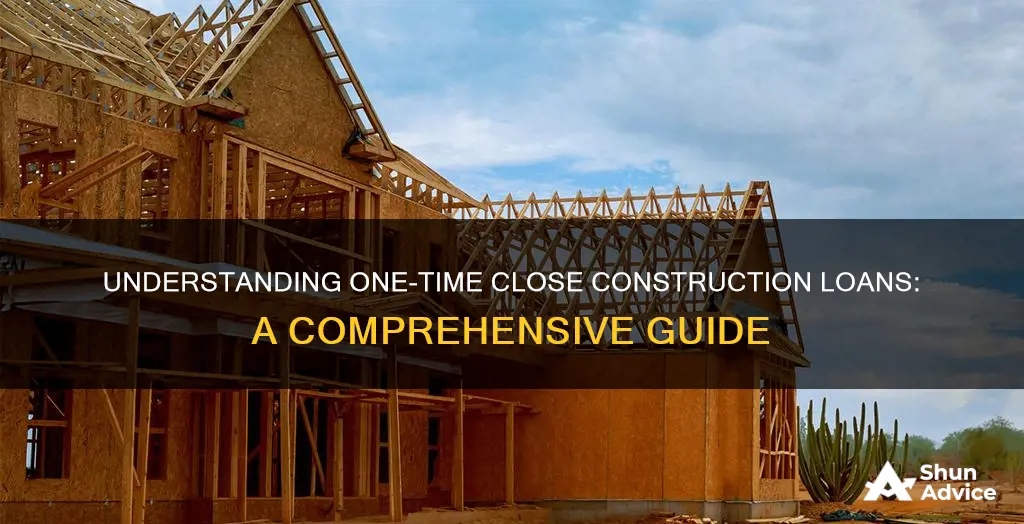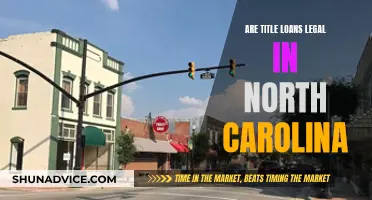
A one-time close construction loan is a type of mortgage for those building a new home. It combines the costs of land purchase, construction, and a permanent mortgage into a single loan with one closing. This simplifies the financing process by eliminating the need for separate loans and multiple rounds of paperwork and closing costs. During the construction phase, the loan acts as a line of credit, allowing borrowers to draw funds as needed to cover construction expenses. Once the construction is complete, the loan converts into a traditional mortgage, typically with a 15- or 30-year term. One-time close construction loans offer financial flexibility with interest-only payments during construction and the ability to lock in interest rates early. However, they may have stricter qualification requirements and higher upfront costs.
One-Time Close Construction Loan Characteristics and Values Table
| Characteristics | Values |
|---|---|
| Loan type | Construction-to-permanent loan, single-close construction loan, one-time close loan |
| Application process | Requires proof of income, credit information, DTI ratio, and assets |
| Down payment | Minimum of 3.5% for FHA loans; 5% for conventional loans; 20% for construction-to-permanent loans; 0% for VA loans |
| Credit score | Minimum of 580 for FHA loans; 680 for conventional loans; 700 for conventional loans with the lowest interest rates; 620 for VA loans |
| Interest rates | Fixed; can be locked in early |
| Interest payments | Interest-only during the construction phase |
| Loan term | 15 or 30 years |
| Number of closings | One |
| Number of applications | One |
| Number of loans | One |
| Use | Primary residence for VA and FHA loans; primary or secondary residence for conventional loans |
| Eligibility | Must own or be purchasing the lot; must meet builder eligibility requirements |
| Time limit | One year to build, with a possible 6-month extension |
What You'll Learn
- One-time close construction loans offer financial flexibility with interest-only payments during the construction phase
- The FHA One-Time Close Loan is a secure, government-backed mortgage program available for one-unit, stick-built primary residences
- The construction phase typically lasts about one year but can vary depending on your lender, permitting, scheduling and the project’s size
- Conventional one-time close construction loans may have higher down payment requirements than other loan programs
- One-time close construction loans can be ideal for borrowers with lower credit scores

One-time close construction loans offer financial flexibility with interest-only payments during the construction phase
A one-time close construction loan is a type of mortgage for those building a new home. It combines the financing for the construction of a home and the permanent mortgage into a single loan. This means you only have to go through the loan application and closing process once, saving time and money.
The construction phase typically lasts about one year but can vary depending on your lender, permitting, scheduling, and the project's size. During this time, the loan acts as a line of credit, allowing you to draw funds as needed to cover the construction costs. The lender works closely with an inspector to ensure the construction continues on schedule and on budget.
The interest rate can be locked in at the beginning, protecting borrowers from future rate increases. However, these loans typically have stricter qualification requirements, including higher credit scores and detailed documentation, which can be challenging for some borrowers. Additionally, they may come with higher interest rates and upfront costs, and the rigid draw schedules and inspection requirements can add complexity to the construction process.
To get a one-time close construction loan, you'll need to choose a builder who meets the eligibility requirements, prepare a contract for the completion of the home construction, and work with your builder to outline the project details like the timeline and costs in a construction contract. You'll also need to provide detailed home plans and specifications for the lender's appraisal.
Red Arrow Loans: BBB Accreditation Status Explained
You may want to see also

The FHA One-Time Close Loan is a secure, government-backed mortgage program available for one-unit, stick-built primary residences
The FHA One-Time Close Loan is a government-backed mortgage program that offers a secure and simplified financing solution for those looking to build their dream home. This loan is specifically designed for one-unit, stick-built primary residences and new manufactured housing for primary residences, excluding single-wide mobile homes.
One of the key advantages of the FHA One-Time Close Loan is that it combines multiple financial aspects into a single mortgage. Borrowers can finance the construction costs, lot purchase (if necessary), and permanent loan with a single closing. This streamlined approach eliminates the need for separate loans and multiple rounds of paperwork and closing costs, making it easier and more cost-effective for borrowers.
The loan provides flexibility during the construction phase, allowing borrowers to draw funds as needed to cover construction costs. It also offers interest-only payments during construction, keeping monthly expenses lower. Once the construction is complete, the loan seamlessly converts into a permanent mortgage, typically with a 15- or 30-year term.
The FHA One-Time Close Loan is ideal for borrowers with lower credit scores, with a minimum credit score requirement of 580. Scores as low as 500 may even be considered with a higher down payment and a capped Loan-to-Value (LTV) ratio of 90%. Additionally, the loan requires a minimum down payment of 3.5%sellers and builders can contribute up to 6% towards closing costs.
The application process for the FHA One-Time Close Loan is thorough and requires proof of income, credit information, DTI ratio, and assets. It is important to note that the loan is designed for primary residences, and investment properties are not eligible. Overall, the FHA One-Time Close Loan provides a secure and simplified path to homeownership, making it a popular choice for those looking to build their dream home.
Understanding Covered Loans: What You Need to Know
You may want to see also

The construction phase typically lasts about one year but can vary depending on your lender, permitting, scheduling and the project’s size
The construction phase of a one-time close construction loan typically lasts about a year. However, this duration can vary based on several factors, including the lender, permitting, scheduling, and the size of the project.
The construction phase is the period during which the borrower constructs their new home. This phase involves working closely with the builder and the lender to ensure the project stays on schedule and within budget. The lender authorises payments or draws to cover various expenses, such as the cost of land, materials, labour, permits, and other construction-related costs.
The time frame for the construction phase can be influenced by the lender's requirements and processes. Some lenders may have specific criteria that must be met before authorising payments, and they may also monitor the progress to ensure the project stays on track. Additionally, the permitting process can impact the timeline, as obtaining the necessary permits for construction may take time and vary depending on the location and complexity of the project.
Another factor that can affect the duration of the construction phase is scheduling. This includes the availability of the builder and their team, as well as any potential delays due to weather conditions or unforeseen circumstances. The size of the project also plays a role, as larger and more complex constructions will naturally take longer to complete than smaller ones.
To ensure a smooth construction process, it is essential to select a qualified and reputable builder who can work effectively with the lender to meet the project's timeline and budget. Proper planning, including detailed home plans and specifications, is also crucial to help keep the project on track and avoid potential delays.
Borrowing Limits: Cash App's Limit Increase Frequency
You may want to see also

Conventional one-time close construction loans may have higher down payment requirements than other loan programs
A one-time close construction loan is a financing solution that combines the costs of purchasing a plot of land and construction into a single loan with a single closing. This simplifies the financing process by eliminating the need for separate loans and multiple rounds of paperwork and closing costs.
This higher down payment requirement is due to the nature of conventional loans, which are not government-backed and therefore carry a higher risk for lenders. By requiring a larger down payment, lenders can mitigate their risk and ensure that borrowers have a substantial financial stake in the project.
Additionally, conventional one-time close construction loans usually have stricter qualification requirements compared to other loan programs. Borrowers typically need a higher credit score, often 680 or higher, to be eligible for a conventional loan. They must also provide detailed documentation, including comprehensive construction plans, cost estimates, and proof of financial stability.
It's important to note that the specific requirements and down payment expectations for conventional one-time close construction loans can vary depending on the lender and the borrower's individual circumstances. Therefore, it's advisable for borrowers to explore different loan options and consult with qualified lenders to find the best fit for their needs.
Amortization Strategies: Repay Your Loan Efficiently
You may want to see also

One-time close construction loans can be ideal for borrowers with lower credit scores
A one-time close construction loan is a financing solution that combines the cost of purchasing a plot of land and the construction of a home into a single loan with one closing date. This simplifies the financing process, as borrowers only need to complete one application and pay a single set of closing costs.
One-time close construction loans are ideal for borrowers with lower credit scores because they offer a streamlined path to securing their dream home. These loans often have lower minimum credit score requirements than conventional loans. For instance, FHA single-close construction loans backed by the Federal Housing Association require a minimum credit score of 580, while conventional loans typically require a score of 680 or higher. Additionally, some lenders may consider scores as low as 500 with a higher down payment and a capped LTV of 90%.
These loans also provide financial flexibility with interest-only payments during construction, allowing borrowers to keep their monthly expenses lower. Once the home is built, they begin paying towards the principal. Furthermore, borrowers can lock in interest rates early, protecting them from future rate increases. This feature is especially advantageous in a rising interest rate environment, helping borrowers secure favourable loan terms.
However, it is important to note that one-time close construction loans typically have stricter qualification requirements, including higher credit scores and detailed documentation. They may also come with higher interest rates and upfront costs. Borrowers must carefully consider the pros and cons of this loan type and ensure they meet the specific requirements, including credit score, down payment, and detailed construction plans.
To get started, borrowers can reach out to lenders to understand their specific requirements and apply for pre-approval to get a full picture of their financial situation and make informed decisions about their loan options.
Understanding HEA Loans: What You Need to Know
You may want to see also
Frequently asked questions
A one-time close construction loan, also known as a construction-to-permanent loan, is a type of mortgage for those building a new home. It combines the financing for the construction of a home and the permanent mortgage into a single loan with one closing.
One-time close construction loans offer financial flexibility with interest-only payments during the construction phase and can lock in interest rates early, protecting borrowers from future rate increases. They also save time and money by streamlining the process of building a new house, as you only have to go through the loan application and closing process once.
The application process for a one-time close construction loan is thorough, requiring proof of income, credit information, DTI ratio, and assets. You will also need to choose a builder who meets the eligibility requirements for financing and prepare a contract for the completion of the home construction.







